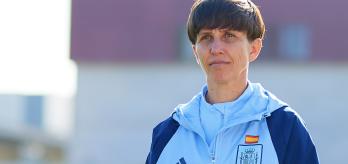Having played football for as long as she can remember, Bermúdez believes she was born with her talent. She clearly takes after her mother who was called up to the national team before retiring from the game at an early age. After an honour-laden playing career, Bermúdez moved into coaching and held various positions before taking the reins of the U23 team, a role she clearly relishes. In this interview she gives a fascinating insight into how the game has progressed since she was a player. She also explains how Spain has moved ahead on the world stage and are now the benchmark for the chasing pack.
Key points
Key factors leading to successful player development in Spain:
-
Development of youth teams at almost every club
-
An evolving mentality in society encourages more young girls to take up the game
-
Strong physicality and talent blended with a unique ideology
Watch interview
Read summary
Part 1: Bermúdez’s transition from playing to coaching
Bermúdez kicks off the interview by discussing how her journey in football began. Then she goes on to describe how she transitioned from player to coach, explaining how she was always interested in this route. Towards the end of her playing career she began to study and when she retired she got her UEFA Pro qualification. She recalls how, as a player in the last few years before retirement, she would analyse training methods and the coach’s talks. She also highlights the year she spent working in broadcasting after retiring and explains how watching and analysing so many games gave her an even bigger push to wanting to become a coach.
Part 2: Evolving as a coach
In the second section of the interview, Bermúdez talks about how she started at the bottom and worked up to her current role where she coaches players mainly from the top division. In the beginning, she knew she would make mistakes and was happy to learn as she continued to grow and gain experience. Over the years, she has had the opportunity to visit many coaches to see how they train and this has helped her to evolve and learn how to become an even better coach. She goes on to describe her management style and pinpoints the close relationship she likes to have with players.
Part 3: How football has changed
In this section, the U23 women’s team coach casts an eye back to when she used to play and compares it to how the game has changed for the better in recent times. She explains how players have much better opportunities now and the improved facilities that are available allow players to dedicate themselves exclusively to football. Bermúdez believes the effort made by clubs and the Federation has been immense and players are now able to focus on football 24 hours a day. She mentions how a much improved physicality blended with talent, and Spain’s own unique ideology, have all helped with Spanish success in recent times. When it comes to consistently producing top talent she cites changes in mentality and an acceptance in society for girls to play football at a very young age as contributing factors.
Part 4: Advice for young coaches hoping to build a career in the profession
The former Spanish international points out that it is difficult because there are still a lack of opportunities and positions available in the profession. However, she believes that for future generations it will be better because now we are seeing elite coaches in the game and more and more people want to be like them. Bermúdez, an ex-striker, then discusses what advice she gives to fellow attackers. She says they are all concepts she acquired when playing such as paying attention to the centre-backs and getting behind them, looking for the best outlet for the ball and using your aggression. She points out that it’s a position where if you don’t score goals you are singled out so she likes to try to help them as much as possible because a goal is worth a lot of money.
Part 5: Impact of World Cups on player development
In the last section of her interview, Bermúdez draws from her own World Cup exploits in Canada. She illustrates how being part of such a huge tournament and having the opportunity to come up against the best players from each country is something that enhances players. She believes it is very important they can be a part of this high degree of competitiveness at all World Cup levels. It is, in essence, the prelude to what they will achieve at senior level so it is a vital experience as they make the leap up the ladder.









